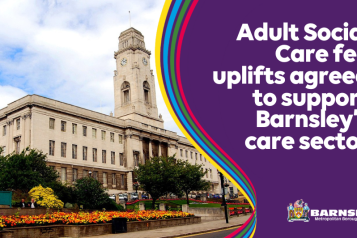More than half of people with chronic and long-term conditions not asked to feed back about their care

As part of our Because We All Care campaign, we're working with the CQC to encourage people who have long-term health conditions to share their experience of getting a GP referral for tests or support.
Approximately 15 million people in England have a condition that impacts their physical and mental health and these are often an invisible illnesses, regularly cared for with support from health and social care services and their friends, family and carers.
As health and social care services face increasing demand, understanding the experiences of those using services is more critical than ever.
Giving feedback on your or a loved one's care helps identify unsafe practices so they can be improved and highlight where support is working well. However, our latest findings show this is not always the case, as people are not being asked for feedback.
We we have found out
We surveyed 1,000 people with chronic and long-term conditions about their experiences using health and social care services.
The survey found that more than half (54%) are not being regularly asked by services to feed back about their care, and almost two-thirds (62%) do not know how to. However, most people (71%) said they would be willing to provide feedback to help the care and services improve.
Other findings
When asked about their recent experience of accessing care, the survey revealed:
- More than two-thirds (69%) were able to be seen by their service within three weeks, outside of their normal scheduled appointments.
- But more than a quarter (27%) of people said the biggest challenge they faced accessing health and social care was longer waiting times.
- A fifth (21%) said ineffective or inaccessible booking systems were the main issue.
What stood out for us
Of people aged 18-24 almost a quarter (24%) said they waited up to six months for an appointment and one in five (21%) reported they do not feel their condition is taken seriously by the service involved.
However, when it comes to providing feedback, 18–24-year-olds were more likely to share their experience of care, 32%, compared to six per cent of those over 75 who have provided feedback in the last 12 months.
Public feedback helps address inequalities
Gathering people’s feedback about services and the care they provide is important in identifying and addressing inequalities so that care can be improved. Not being able to access the right care and support at the right time increases the risk of an individual’s health deteriorating. Working with the CQC we want to address health and social care inequalities and reduce barriers to care.
“People with chronic and long-term conditions often rely on health and social care services more and their insight into the care they receive is invaluable to us. Our research shows that people want to give feedback to help improve the care services in their community and to help protect people and their loved ones from harm. It is vital that people feel empowered to speak up about their care, we want to learn from their lived experiences, champion their voice and ensure people get good safe care.
“CQC receives over a thousand pieces of feedback from people about their care every month, highlighting good care as well as drawing attention to where care needs to improve - uses this information to inform our inspection work, to help keep people safe and to support improvements. Information of concern triggers around half our inspection activity, which is prompted by new information provided to us by people using or working in services. You can provide feedback to CQC using our Give Feedback on Care form or to our contact centre on 03000 61616.”
"Patient feedback is a vital source of information to help NHS and social care decision-makers understand if care is working. That's why it's concerning to hear that many people living with chronic conditions have not been asked for their views.
"As we head into the winter, the NHS is facing pressures across the whole system. Patient feedback can help by enabling the NHS to spot issues and identify where services may need more help. It's important to make more people feel empowered to share their experience, be it good or bad, and to be aware of how their feedback is helping improve support for them and their community."
We want to hear from you
Do you have a chronic and long-term condition? What is your experience of getting a GP referral for tests and support?


